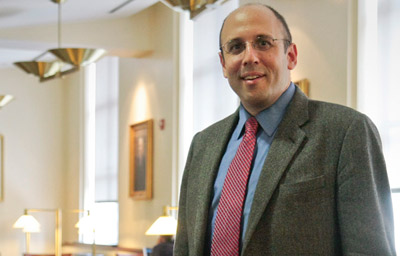
The dean of the GW Law School reversed a decision Tuesday to make cuts to a stipend program that aids jobless graduates, reinstating the program’s full pay Tuesday after rampant complaints.
Graduates signed up for Pathways to Practice – a program Dean Paul Schiff Berman started last year that gives budding lawyers a $28,000 stipend for unpaid gigs at law firms if they cannot score a job after graduation – would have seen their hourly wage bump down from $15 to $10 on Dec. 1 if they were still unemployed. Berman had announced the cuts in a letter to graduates in the program Monday.
He backtracked the following day, saying graduates would still see the same wages – despite limited funds to support the program.
“I have heard from many of you in the past 24 hours. You have expressed disappointment about adjustments made to the [Pathways to Practice] program,” Berman wrote. “Accordingly, I will redouble my efforts to make the funds available for the Program, and I hereby rescind my earlier e-mail and will return the funding to its previously announced level of $15 per hour.”
The law school will start paying graduates in the program this fall if they have not yet found a permanent job. In turn, law firms will hire graduates for free, with the law school giving graduates the stipend so they can get their legal experience without a full-time paying job.
Funding for the program, which comes out of the law school’s about $80 million annual operating budget, takes up “extraordinary financial resources,” Berman wrote. He said in an email Tuesday that he expects about 80 graduates to take part in the program.
Law schools across the country have started programs like Pathways to Practice in recent years, looking to cushion graduates entering a harsh legal job market. Adding students to these programs also helps bolster employment numbers reported to rankings organizations like U.S. New & World Report or accrediting bodies like the American Bar Association.
Nationwide, 85.6 percent of 2011 graduates were employed, the worst job market since 1994, according to a report this month by the Association for Legal Career Professionals.
GW’s 2011 law school graduates fared better than average last year. About 81 percent of 2011 graduates landed full-time, long-term positions within nine months of graduation – pushing the University into the top 10 nationwide for job success in the survey published by the American Bar Association.
Initial employment statistics for this year’s graduating class will likely not be released until the fall.
In the first letter to graduates Monday, Berman wrote that he had “heard several anecdotal reports of graduates turning down paying work so that they can remain in the Pathways Program and hopefully find more desirable work later. This is not how the Program is intended to be used.”
Berman told The Hatchet last month that the program was designed as “a backstop in case [students] need help for a little while.”
“I’m giving them a stipend up to a full year after graduation so they can volunteer and work themselves into a job, so I think that’s really helped students to get a foot in the door in the job market,” Berman said last month. “That’s one of my initiatives.”
One graduate said last month that the Pathways to Practice program was popular among her peers, adding that there were “easily about 100” graduates in the program. The graduate, who was signed up for the program but has since found a permanent job, asked to remain anonymous because she did not want potential employers to know she had not found work.
“It’s not something students will shout from the mountaintops that they’re in this program because [that means] they’re not employed yet,” she said.
The controversy comes the same week as the hire of a new associate dean for professional development and career strategy, which Berman announced on his blog Tuesday. Abe Pollack, a current administrator at the Georgetown University Law Center, will take the lead on helping students find job in a crunched job market.



